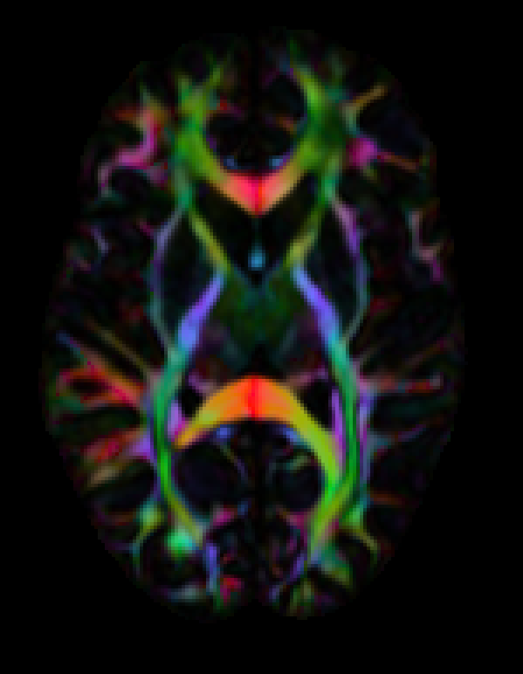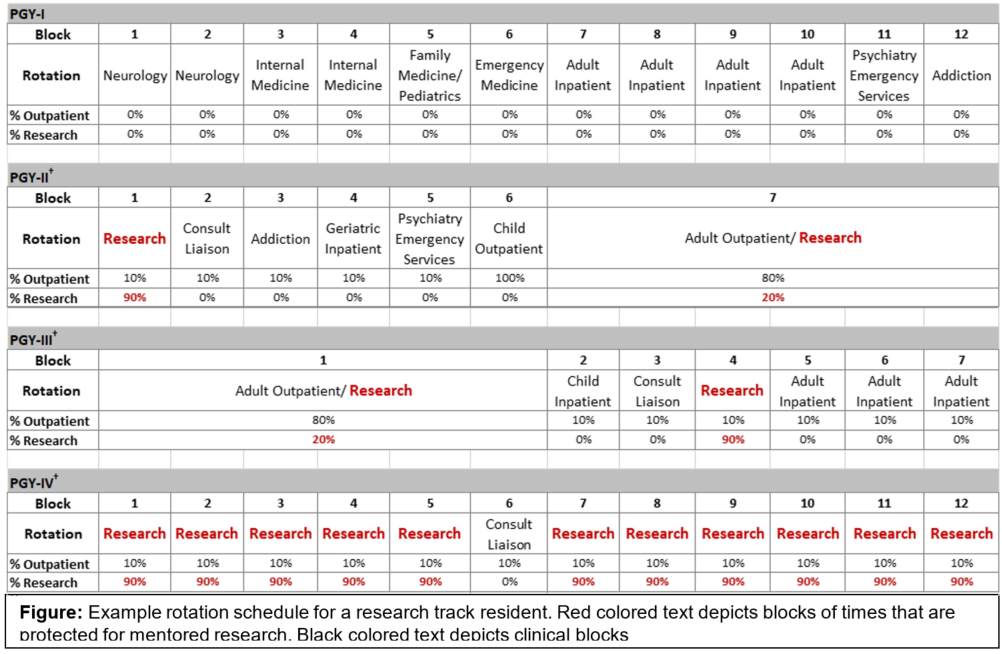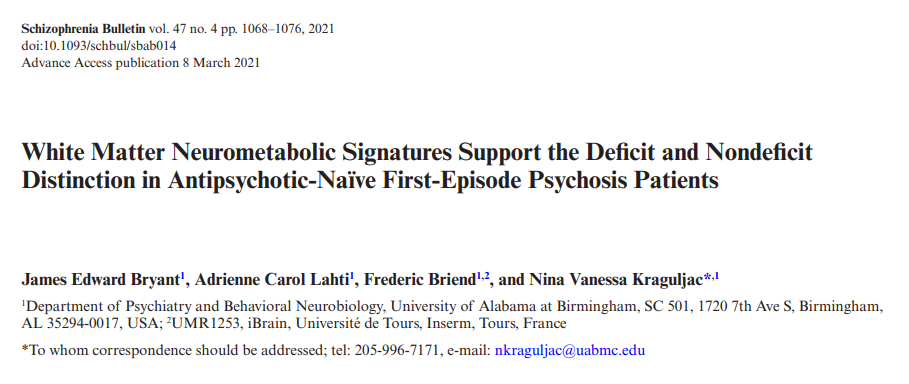 The research track diverges from the general track in PGY-II. Service requirements are reduced in a manner to allow significant portions of time to pursue research. Protected time can be scheduled in blocks (basic science research) or as a longitudinal experience (translational or clinical research). Residents broaden their experience through didactic lectures, practical workshops on biostatistics, grant writing and manuscript writing and direct involvement in ongoing research projects under the guidance and mentorship of a senior investigator. Ongoing support and guidance from faculty leaders and scientific mentors provide a rich, supportive learning environment for residents’ as they progress through the program.
The research track diverges from the general track in PGY-II. Service requirements are reduced in a manner to allow significant portions of time to pursue research. Protected time can be scheduled in blocks (basic science research) or as a longitudinal experience (translational or clinical research). Residents broaden their experience through didactic lectures, practical workshops on biostatistics, grant writing and manuscript writing and direct involvement in ongoing research projects under the guidance and mentorship of a senior investigator. Ongoing support and guidance from faculty leaders and scientific mentors provide a rich, supportive learning environment for residents’ as they progress through the program.
-
Research Rotations
STEPP residents will receive comprehensive research training by participating in didactic coursework and other learning opportunities outside the laboratory. They will obtain knowledge in
(1) ethics/ responsible conduct of research
(2) biostatistics and study design
(3) career development/ leadership
(4) communication of research findings
(5) scientific writing
(6) individualized coursework specific to the field of study.
The didactic portion of the curriculum incorporates a variety of UAB programs available through the CCTS and the Office of Postdoctoral Education.
PGY-I
PGY-I year residents broaden their knowledge of current research projects and research-based initiatives within the department and learn how to integrate their research identity into a clinical identity to support the process of identifying a research interest and mentor. Residents attend research track meetings and research day, meet with potential research mentors and the RRT director for feedback and guidance.
PGY-II
The focus of PGY-II is to establish a relationship with their identified mentor and to get actively involved in a research project. Residents attend research track meetings and research day, regularly meet with their mentor and participate in lab meetings. Institutional support includes up to two months of protected time for research related activities.
PGY-III
Residents are fully engaged in project design and implementation while building a foundational knowledge of methodologies, statistical approaches, and data presentation. Residents attend research track meetings, present a poster at research day, regularly meet with their mentor and participate in their lab meetings. Institutional support includes up to 20% protected time for research related activities and protected time for research track meetings and research day.
PGY-IV
The focus of PGY-IV is to complete the research track project, prepare and submit the results for publication, and present their project at Grand Rounds. Residents continue participating in lab meetings, meet with their research mentor on a monthly basis, attend research track meetings, present their work at national meetings and apply for travel fellowships. Institutional support includes up to 80% protected time for research related activities and protected time for research track meetings and research day.
-
Friday STEPP Lunch
The Friday STEPP Lunch is a monthly seminar series with all research track trainees that covers a diverse set of topics. Attendance of 70% of the seminars will be required for PGY-II to PGY-IV residents; PGY-I residents interested in STEPP are invited to attend.
We invite program faculty to discuss important considerations for residents interested in a career as a physician-scientist. These topics include:
(1) The mentor-mentee relationship, and how to most effectively take advantage of a mentorship team.
(2) How to determine a realistic scope for a research project during residency training.
(3) Common misconceptions about working in an academic environment and a physician-scientists’ lifestyle.
(4) Academic promotion within the institution, giving a clear timeline for an actual academic career path.
(5) Reflections on career paths from current junior and senior research faculty
(6) Education on financial and personal factors of careers in research. Given the reality that extensive debt burdens can limit the ability of young physicians to choose careers in research, we will also invite junior and senior researchers to educate residents on potential considerations and issues. Discussions will include benefit packages, performance incentives, prospects for moonlighting, and the NIH loan repayment program as opportunities to bridge the gap between earning potential in academic vs private practice settings.
(7) Opportunities for residents to present “practice runs” of presentations of their work at local and national conferences, with peer feedback as an essential component
As part of the Friday STEPP lunch seminar, we will have a workshop each year that will be taught by senior faculty members. This workshop will cover a broad range of topics, including:
(1) Searching for available positions
(2) Responding to job advertisements
(3) Crafting an effective curriculum vitae and research statement
(4) Preparing for a job interview
(5) Discussing skills necessary to successfully compete for a postdoctoral or faculty position -
Research Presentations
PGY-III and PGY-IV STEPP residents will be required to present results of their research project during the annual UAB Psychiatry Research Symposium, held during the second week of April each year. Resident projects will be presented in poster format. Judges will review all posters based on scientific merit and presentation skills.
PGY-IV STEPP residents will be required to present their research at Grand Rounds in the Department of Psychiatry and Behavioral Neurobiology. This will give them an opportunity to learn how to communicate their research findings to a mixed scientific and clinical audience.
Residents will also have an opportunity to participate in the annual UAB Comprehensive Neuroscience Center Retreat and the annual Alabama Advanced Imaging Consortium Retreat. These forums provide the residents an excellent opportunity to organize and present their research to scientists both within and outside their primary field of interest and will provide an outstanding experience in preparation for presentations at national scientific meetings.
We will require STEPP residents to submit an abstract to a national meeting in their final year of residency training; recommended meetings include American College of Neuropsychopharmacology [ACNP], the Society for Neuroscience [SFN], the Society of Biological Psychiatry [SOBP], and the American Society of Clinical Psychopharmacology [ASCP]. Attendance of meetings is pivotal for their scientific development and provides them an opportunity to receive critical feedback for their research project, to acquire a broader snapshot of cutting-edge scientific developments relevant to their field, and to network with other scientists. -
Scientific Writing
There are a number of outstanding courses focused on scientific writing available at UAB. The CCTS Professional Skills Development series targets numerous sessions on manuscript and abstract writing. The Office of Postdoctoral education offers a grant writing course and introduces all aspects of grant writing, including selecting funding mechanisms, writing individual grant sections, and understanding administrative policies. All STEPP residents are encouraged to have at least one first author peer-reviewed publication by the completion of PGY-IV.
